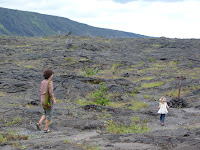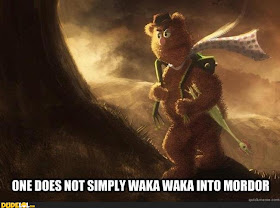HIKING
KILAUEA IKI , or...
 |
| The faint trail across Kilauea Iki in Volcanoes National Park. Credit: Hawaiigaga.com |
CROSSING MORDOR
WITH A THREE-YEAR-OLD
On
our recent visit to the Big Island of Hawai’i, my geology-loving husband was
intrigued at the sight of tiny toy-like hikers crawling across the black floor
of Kilauea Iki crater, as we stood
with our three-year-old on the uppermost edge of a massive volcanic crater in
Volcanoes National Park. Try to imagine it: several hundred feet deep, two and
a half miles wide, and about half a mile wide, like
Satan’s dirty bathtub with all the water gone. However, where we stood, Kilauea Iki Overlook on the Crater Rim Drive, a frenetic road for tourists to quickly gather the mind-blowing sights of this
national park, it seemed like only special people got to hike here.
I
admit, the thin grey trail across the caldera seemed pretty cool. Then
my husband and I looked down at our daughter, playing with pebbles beside tourists snapping
photos.
“G-Beans,” we said, addressing her by nickname, “wanna go down there?”
Taking
her lack of protestation as a positive sign (and boy were we delusional), we
decided that yes, we’d enter Kilauea Iki the next morning. An informational
placard at Kilauea Iki Overlook warned that the descent into the crater was 400 feet (122 m), the height of a 40-story skyscraper. For city folks, that's small potatoes.
There was a recommended hike of four miles (6.4 km) that took one into
the crater, across it, up the opposite side, and along the precipitous edge. It
looked great, but we decided it was a hike intended for older kids and adults.
Ahh, my husband and I sighed. Just the other day we had driven halfway up Mauna Kea mountain to see the world-renowned astronomical observatories, only to be rebuffed by a ranger who said we couldn't take a child to the top because of the lack of oxygen. But in 12 years, sure, she could go.
Here we were, at another great exploratory opportunity on the Big Island. We stood in the shade of tropical trees, looking wistfully down. Perhaps because that blazing sun was out of our eyes, we could think straight. Our wits hadn't melted out of our brains. Yet.
We decided that the next morning (note how we thought it would nice and cool in the morning, just like in San Francisco), our nuclear family would take the switchback trail dropping off the parking lot by Thurston
Lava Tube, hang out on the crater floor for a few minutes, ogle the lava
plateau, and go back up the way we came. Easy peezy.
Would we cross the plateau with a three-year-old? It looked tempting, but no way, Jose.
We’re
responsible parents. Sure we like hiking, but are we fifteen-year-olds in the
bodies of thirty-eight-year-olds, capable of hijacking a toddler across a
volcanic crater?
 |
| Pu'u Pua'i, ground zero of Kilauea Iki. Credit: wikipedia |

*
 |
| The girl who blazed trails. |
The next morning, the ranger at the parking lot
thought our kid could make the whole hike.
“Sure, she can,” she hooted at my question
about toddlers hiking across Kilauea Iki. “Just bring
plenty of water.”
We grabbed hats, sunscreen,
and a long-sleeved shirt for the kid. Long pants too (on her), our thought process simple: sun protection. We wore sandals, except the kid, who had closed-toe Mary Janes. A couple who had just finished their hike
must’ve thought we were nuts, and they insisted on giving us their official trail guide.
And so we dropped over the edge of
the caldera.
The
downhill trail was gorgeous—long switchbacks under a towering canopy of rain
forest trees and foliage, full of fragrant kahili ginger and the sound of
Hawaiian songbirds. Four hundred feet below the trailhead, we reached the crater floor.
Talk
about out-of-this-world. We had never seen anything like this crater floor with
its black, undulating surface with trickles of steam ghosting out of fissures
here and there. Follow the ahu (“stacked
rocks”), said our trail guide, and if you couldn’t find those you probably
shouldn’t be down there, but the way was visible from the greyish gravel trail
stretching across the crater, and a dozen numbered markers.
Our daughter was in phenomenal
spirits. She had walked—no, ran—the entire downhill trail on the side of the
crater, and now she struck off across the wide black floor.
 |
| It was all fun and games on the crater floor--at first. |
*
 |
Kilauea Iki erupting in '59.
Credit: usgs.gov |
“We
were continually broiled by radiant heat from the fountain and flows and were
bathed in strong, at times choking, sulfur dioxide fumes,” wrote D.H. Richter, a
USGS scientist in 1959. Before then, Kilauea Iki was twice as deep (800 feet)
and covered with trees.
According
to our trail guide from the visitor center, one night in November of 1959, the
earth began rumbling. A “curtain of lava” blazed out of a crack half a mile
long in the crater wall. The crater filled with a “lake of lava,” 86 million
tons of molten rock.
In the end, three days before stopping, the final surge of
lava went skyward, 1900 feet (580 m), the highest surge on record in the
island, and five times higher than Pu’u
Pua’i (“gushing cone” in Hawaiian), ground zero at Kilauea Iki.
*
Maybe
a quarter mile across the lava field, our daughter began to protest. We carried
her on our backs and shoulders, our legs moving quickly as we followed the stacked
rocks. Her grumpy noises became full-fledged cries, and boy did we feel stupid. She wanted to walk, so we'd set her down. Then she'd want to be carried. So far, nothing really abnormal.
Did
I mention we forgot to bring a hat with a large brim for our daughter?
“Wear
my hat, Genevieve,” one parent would say.
“No!
I don’t wanna!”
“I’m
putting this on you whether you like it or not.”
“No,
waaaaaa!”
 |
Though you can't hear her, there is sound,
a big, sad sound. |
Perhaps
to make us feel better, the universe sent hikers with children, though
traveling in the opposite direction, and those children were around
five to fifteen years old. They gave our girl sympathetic looks and us stony
glances. Their parents bared teeth in hot grins, sweat dripping down their
middle-aged faces.
 |
We still had to walk through the narrow point,
then up and around the crater rim trail.
|
The sun shone and though it was early October, I think the temperature at the overlook was about eighty degrees Fahrenheit. But within the crater, surrounded by black lava and steam vents, the temperature soared.
The trail was undulating to flat as it beelined across the diabolical bathtub, but once we approached Pu’u Pua’i on the far end, the trail herked up and down. The hardened lava had been smooth for most of the walk, but now it was jagged and sharp. When our daughter wanted to walk, we had to carry her for fear she might slice her feet open on a tumble.
By
the time we reached the far end of Kilauea Iki, we fully regretted having
dragged G-Beans on this hike. We still had to take the sunny switchback
up the far side of the caldera, and
walk a mile or so on the Crater Rim Trail to the parking lot.
Our
daughter was pissed and would not be appeased. Her fists pounded on the top of her
father’s head, mashing his hat, and my hat (which was on her head in fits and
bursts) often went sailing through the air.
 |
| JRR Tolkien's inspiration for Mordor? |
A
funny thing happened when we approached the end of the hike. Laughter, sweet
childish laughter.
“Let
me down! I wanna walk!”
“No,
you’re too slow. We gotta get back before you melt.”
“No!
Let me down!”
Upon
her insistence, our girl was placed on her feet. We were under trees now, amongst the ferns and towering ohia lehua trees. Our daughter gave a smile, and went
trotting forward, ready to tell the world that (one) this three-year-old had
traversed the mighty Kilauea Iki crater, and (two) she had escaped her parents.
 |
How our daughter felt, or Kilauea Iki in '59.
Credit: USGS.gov |
*
PHOTO ALBUM
 |
What a lovely trail through the rainforest
on the edge of Kilauea Iki,
we were all thinking. |
 |
ABOVE: On the caldera floor. Note Little One is having doubts
while Parents look stupidly eager.
BELOW: Kitty's moment in the limelight. Note the dour expression
even on this stuffed animal.
 |
 |
| Look where we're gonna walk today. Now go! |
 Pu'u Loa Petroglyph field is a 1.4 mile round-trip walk on the Big Island of Hawaii, and it seems perfectly fine for a little kid, especially on an overcast day, such as it was this past September when the nuclear family visited the Volcanoes National Park.
Pu'u Loa Petroglyph field is a 1.4 mile round-trip walk on the Big Island of Hawaii, and it seems perfectly fine for a little kid, especially on an overcast day, such as it was this past September when the nuclear family visited the Volcanoes National Park. 















































